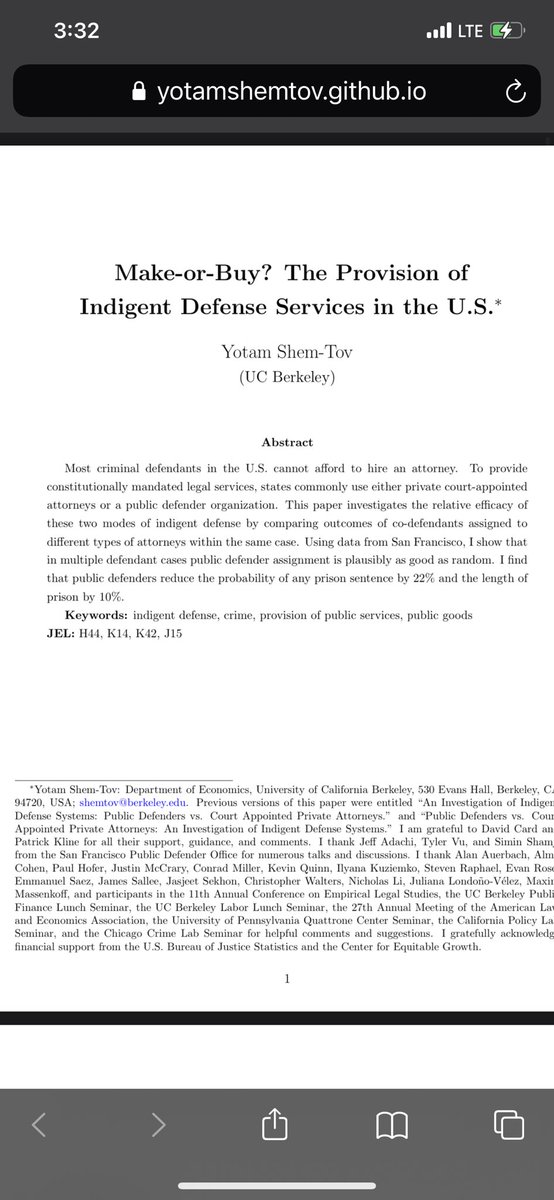Hugely important new paper forthcoming at Restat by Yotem Shem-Tov, at Berkeley. In some jurisdictions, if an offense has multiple offenders, and neither can afford a lawyer, they’ll be seemingly or explicitly randomly assigned to either public defender or a private attorney 1/n
These private attorneys are paid flat fees usually which economic theory imo predicts reduced effort. Maybe even higher pleas at the margin. Reason being, flat fees are not tied marginal effort. Lawyer gets same whether they spend one hour or a thousand hours 2/n
These incentive structures technically comply with the sixth amendment but theoretically they have different impacts on indigent defense. 1) possibly negative selection of moonlighting (not wanting to overstate this). 2) less effort on a case. 3/n
My experience with public defenders office on the other hand is extreme positive selection, passionate lawyers who are practically altruistic they care so much about indigent getting just defense. 4/n
In San Francisco, if it’s multiple offenders for the same offense, they’ll apparently randomize between public and private attorneys. Ironically, I literally spoke to one of my best friends, a former Georgia public defender, last week and he suggested this design. 5/n
But, he told me that in Georgia it isn’t exactly random, so I want to see how and if this paper handles the problems in Georgia. In Georgia, public defenders will in that situation consistently pick the *worst* offender. Of course, that predicts *worse* outcomes too 6/n
Anyway, may be different in SF, so back to my point. Now what I’ve been thinking is these private attorneys moonlighting have less incentive to exert effort at the margin relative to public defenders who in addition to positive selection imho have more resources too. 7/n
So a private attorney who is often paid a flat fee of $750 needs to generate *volume* in order to make this profitable. Which means given capacity constraints in time, push these cases through as fast as possible. 8/n
Reminds me then of recent cash bail papers like Dobbie and Yang, @MeganTStevenson and @emilycleslie who focus on measures like guilty pleas. Yotam looks at disposition. So check this 9/n
Being assigned public defender reduces probability of any prison sentence by a Whooping 22%, and length by 10%. Huge effect imho. So why should we care? 10/n
The sixth amendment guarantees indigent defense but DOES NOT specify HOW the states will provide this. Will they use public defenders office? Private attorney moonlighters? Flat fees if so? Billable hours? It’s a big deal tbh 11/n
It’s a big deal bc if these structures of providing the public resource have different behavioral predictions, then you can have relatively worse outcomes for the poor while still technically complying with the sixth amendment. 12/n
Great looking paper. Can’t wait to read it. I am working on a similar study but I’ll share mine another time. Super encouraged this paper was done and has a high profile, high visibility outlet. Tell Yotam congrats if you see him. 13/n https://yotamshemtov.github.io/files/Shemtov_indigent_2019.pdf">https://yotamshemtov.github.io/files/She...

 Read on Twitter
Read on Twitter


